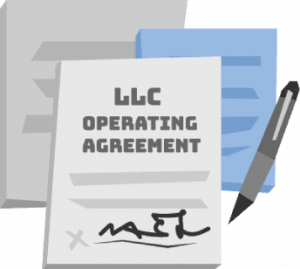How to Start a Limited Liability Company in DC
To start a Washington DC LLC, you need to choose a District of Columbia registered agent, file business formation paperwork with the DC Department of Licensing and Consumer Protection (DLCP), and pay the $99 filing fee.
Our guide takes you through the steps to set up a limited liability company in DC.

1. Name Your LLC
District of Columbia limited liability companies are required to have business names that are compliant with DC § 29-103.01, which means your LLC name needs to:
- Include an LLC indicator like Limited Liability Company, Ltd. Co., or the classic LLC.
- Be different from any other business name registered or reserved in DC.
- Not include words like bank or insurance without proper approval.
You can reserve a business name for 120 days by filing a Name Reservation Registration & Transfer (Form GN-3), and paying the $50 filing fee.
It costs $55 to file a Trade Name Registration form in DC. You can file online, by mail, or in person. A DC trade name—also called a DBA or a fictitious name—lets you operate your business under a name other than your business’s official name.
You must renew your trade name every other year. This is also $55. It will be canceled if not renewed every two years between April 1st and September 1st.
Your business name is important because it is often the very first impression your business makes. You want your Washington DC LLC name to positively reflect your products/services. This is why some businesses add a trade name/DBA as their business changes.
Because your LLC name is so important, choosing a good domain name is also important. Your domain name—or your website address—is another reflection of your business. Typically, people choose domain names directly connected to their business name, if not the business name itself.
Create Your DC LLC!


2. Get a Domain Name
A website domain that matches your business name will improve search engine visibility, driving more customers to your doorstep. Northwest makes it easy and can get you a domain instantly. In fact, all of our LLC customers get:
- One year of free domain registration.
- A customizable business website that’s kept safe with top-shelf SSL security.
- Up to 10 professional business email addresses.
- A business phone number with local area code.
- Friendly Corporate Guides®; have questions about a filing or form? We have answers!

3. Designate a Registered Agent
A Washington DC registered agent is a person or business who accepts legal mail on behalf of your LLC in person. They must be:
- Over 18 (if an individual and not a business).
- Available during regular business hours.
- Able to accept important mail and get it to you in a timely manner.
- Physically located in Washington DC, with a street address, not a P.O. Box or virtual office.
Your registered agent could be you, a member or manager of your LLC, or someone outside of your LLC altogether—like a professional registered agent.
Yes. To change your registered agent in DC, you just need to file a Statement of Change of Registered Agent Form (scroll to page 3) with DLCP. It costs $50.
Nearly anyone with a physical DC address can be your registered agent, as long as they’re willing to have their personal information on a public database and be officially responsible for getting you your legal mail. If you’re looking for an easy, safe, and private option, Northwest is here to help.

4. Submit LLC Articles of Organization
Filing your DC Articles of Organization with the DC Department of Licensing and Consumer Protection is the step that officially creates your limited liability company in DC. If the DLCP rejects your Articles, your LLC is not legally formed.
Everything on this form will go on the public record.
You’ll need to provide:
- Business name. Remember to follow DC’s LLC naming laws.
- Registered agent information. This must include a physical address, not a P.O. Box.
- Effective date. Most LLCs form as soon as the Articles are processed, but you can choose any date within 90 days of filing.
- Miscellaneous provisions. This is where you can include anything extra. If you’re forming an LLC that offers licensed services (a PLLC), you’ll list your professional service. If you’re forming a Series LLC, you’ll need to state that here.
- Member and manager information. Anyone who holds more than 10% membership interest or controls financial, operational, or day-to-day dealings must be listed.
- Organizer. Whoever files your Articles needs to provide a name, address, and signature. Hire Northwest to form your DC LLC and our information will go here.
There is a $99 filing fee to start your Washington DC LLC. If you want your LLC filing processed fast, you can pay the state an extra $50 for 3-day processing, or an extra $100 to have your application processed the same day the state receives it.
You can submit your Articles of Organization to DLCP online, by mail, or in person.
By mail:
Department of Licensing and Consumer Protection
Corporations Division
P.O. Box 92300
Washington, DC 20090
In person:
1100 4th St, SW
Second Floor
Washington, DC 20024
Online:
via DC’s online filing system, CorpOnline
A Series LLC is a group of LLCs owned by a top-dog LLC. Not all jurisdictions allow for them, but Washington DC does. To start a Series LLC, first make a regular LLC. Make sure that the Articles clearly say it will be a Series LLC. This creates the parent LLC. Then file the Certificate of Series Designation for a Domestic LLC, Form DLC-4.
Registering a Series LLC in DC costs a hefty $220. The good news is you can file a single Certificate for multiple series.
Starting an LLC in Washington DC is beneficial because it lets you protect your assets. An LLC creates a separation between you and the business, which helps protect your personal assets if the LLC gets sued, for example.
But Washington DC in particular is a great place to start an LLC. Here’s a few reasons why:
- access to funding, investors, and government subsidiaries
- big, diverse population, which means your pick at the talent pool and a variety of consumer markets to break into
- business incentives specific to the DC area
Your Washington DC LLC Is Formed. What's Next?

Write an LLC Operating Agreement
An operating agreement is the rule book for your Washington DC limited liability company. You don’t have to have one, but most LLCs do. An operating agreement is a legally binding document, meaning once in place, it has to be followed. This might sound constrictive, but it’s a good idea to have a plan before the tricky stuff happens.
Your DC LLC operating agreement can include anything you want, as long as it’s legally sound. Typically, it has processes for voting, profit distribution, and dissolving your business. It is an internal document that doesn’t need to be shared with anyone outside your LLC except maybe your bank or loan provider.

Get an EIN, Bank Account & Funding
Most people start an LLC in Washington DC to make money. You heard it here first! And if you make money, you need to put it somewhere and pay your taxes. To do either of those things, you’ll need an EIN (Employer Identification Number). The EIN is the business version of a Social Security number.
To start a business bank account, you need to bring:
- the LLC’s EIN
- your DC LLC Articles of Organization (a copy is fine)
- the LLC’s operating agreement
- an LLC Resolution to Open a Bank Account (if your LLC has more than one member)
You’ll also need to fund the LLC so you can do things like hire an employee or buy materials. Each member needs to make an initial contribution. The percentage of ownership in the LLC is directly correlated to how much they contribute. This is called membership interest.
You get an EIN for your DC LLC by filing an application with the IRS. If you have a Social Security number, you can file online. If you don’t have an SSN, you’ll need to file by mail.
How much you pay yourself from your LLC depends both on how well the business is doing and how you’ve decided to get paid. There’s two main ways to get paid:
- as a W2 employee getting an annual or hourly rate
- through profit distributions, typically a percentage amount for each member
As long as it’s in your operating agreement, it doesn’t really matter, so you do you.

Get a Business License
Every business in DC needs at least one business license: the Basic Business License. To get yours, do the following:
- file your Articles of Organization
- get an EIN
- register with the DC Office of Tax and Revenue
- register with the Office of Zoning Administration if physically operating in DC
- file your Basic Business License application—which specific basic business license you need will be determined by your business activity
It costs $6.60 per license. You must pay with a credit/debit card.
You can apply either online at My DC Business Center, or in person:
DLCP Business License Center
1100 4th Street, SW, 2nd Floor
Washington, DC 20024
When you register with the DC Office of Tax and Revenue, the state will check to see if you have any outstanding debts owed to the District of Columbia. If you owe more than $100 for fees, fines, taxes, or penalties, and/or haven’t filed your DC tax return, you’ll be denied your business license.

File Taxes & Reports
All Washington DC LLCs need to file taxes and reports. This is how you let the state and federal government know what your business is up to.
- Federal taxes: DC LLCs are taxed as pass-through entities, so owners (members) will report the business’s earnings on their individual tax returns. This is taxed at the federal self-employment rate, 15.3%.
- DC Franchise Tax: LLCs in DC are subject to an annual franchise tax of 8.25%. For LLCs with $1 million or less in gross receipts, the minimum payment is $250. LLCs with over $1 million in gross receipts will owe at least $1,000.
- Biennial report: Every two years, you’ll need to file a report with the DLCP to update them on your LLC owners and contact information. This costs $300. It is due on April 1st. Never miss a deadline when you hire Northwest to file your DC Biennial Report.
*This is informational commentary, not advice. This information is intended strictly for informational purposes and does not constitute legal advice or a substitute for legal counsel. This information is not intended to create, nor does your receipt, viewing, or use of it constitute, an attorney-client relationship. More information is available in our Terms of Service.

